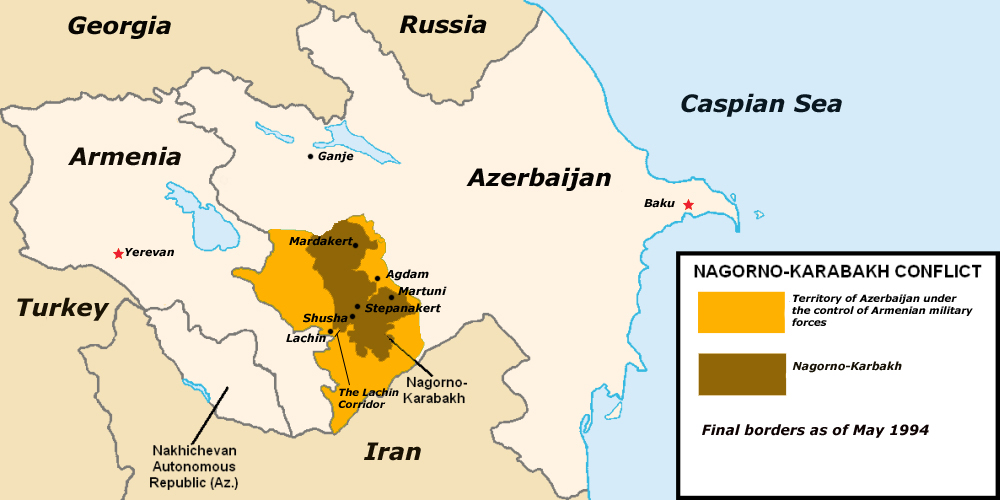Before it’s too late
For a future historian reading Europe’s history, the problem in Nagorno-Karabakh might not pose a wider threat the way it does now. Constantly manipulated as a “disputed territory”, a “separatist movement” or a “breakaway region”, Nagorno-Karabakh makes headlines from time to time. Alas, this was not always the case, with its millennia–old churches and monasteries, the sort that Montserrat Caballé admires, but skirmishes and warfare between the Karabakh Defence Army and the heavily armed Azerbaijani Army are currently occurring.
April 8, 2016 -
Eduardo Lorenzo Ochoa
-
Articles and Commentary

Map (CC) Clevelander: commons.wikimedia.org
In the West, Karabakh has often been artificially presented as “an Armenian aggression with Russian help to occupy Azerbaijani territory”, and sadly enough some in Europe buy it. Sometimes, we are manipulated to make artificial distinctions between our own values and national interests. While being aware of the importance of principles, which form the basis of our policies, we feel proud of our ability to critically examine our own selves, attitude and lifestyles. And while having principles is necessary, getting entrapped in dogmas is dangerous. Have we ever tried to critically examine our labels, such as “separatist”? Do any of us understand that a “breakaway” state might be quite sustainable and much more democratic than its former metropolitan power? That is what Freedom House suggests, putting Karabakh’s ranking as “partially free”, compared to “”Azerbaijan which is “not free”.
What happened between April 2nd and 5th constitutes a milestone for our attitude towards this conflict and broke some dogmas that have prevailed in Europe’s political landscape for the last two decades. What the international community got from this seemingly intractable conflict is first and foremost Azerbaijani interest in a resumption of hostilities. Many internationally recognised think tanks like the International Crisis Group, Chatham House and authoritative experts like Thomas de Waal and Vladimir Kazimirov pointed to Baku’s regime as a party interested in the resumption of warfare and therefore responsible for the resumption of the conflict.
Secondly, Azerbaijani troops carried out war crimes by killing a 12 year-old child and wounding two others during the short occupation of the Karabakhi of village Talish. Azerbaijani soldiers also killed and maimed an elderly lady, born in 1924, and another elderly couple, all from the same family, by cutting their ears in a style typical of ISIS; these civilians had been unable to leave the village, This was one of the most horrible and haunting scenes from this last conflict.
Importantly enough, the international community started distinguishing between the Nagorno-Karabakh Republic and Armenia proper. International media giant CNN interviewed Karen Mirzoyan the foreign minister of the Nagorno-Karabakh Republic along with his Azerbaijani counterpart, while Al Jazeera and France24 quite reasonably asked for comments from NKR envoys in the US and France respectively. The message that these Karabakhi officials conveyed to the international community was crystal clear; “it is not a matter of territory; it is a matter of self-determination”. The US State Department spokesperson highlighted right after the beginning of the conflict that it should be resolved according to international law, the UN Charter and the Helsinki Final Act, which also include the principle of self-determination. This specific emphasis is not surprising given the president of Azerbaijan’s increasingly autocratic style of governance, with one of the worst human rights records, rife corruption and offshore scandals, as the Panama Papers once again displayed recently.
And last but not least, we are gradually getting the most important message from this mini-war. We ought to act before it’s too late. Azerbaijani attacks on civilian populations clearly indicate its intention to wipe the Karabakhi people out of their land. Ominously, Turkey, which still does not recognise the Armenian Genocide perpetrated on its territory as indicated by thousands of resolutions (including one made by the European Parliament in 2015) is encouraging Azerbaijan to solve its own “Armenian problem”. An EU candidate country that hopefully might play a stabilising role in its neighbourhood is by all means helping Azerbaijan in its anti-Armenian policies. Armenian ghost towns in Turkey are clear indicators of what Turkey’s vision regarding Armenians looks like. We cannot and must not tolerate another Armenian Genocide right on Europe’s gates.
Hopefully, a future historian will read this article as a lesson learnt; otherwise we will all be judged by history for our lack of will to prevent the destruction of an ancient civilisation. We would be acting like new Neville Chamberlains, who tried to appease or contain an aggressor and got something much worse – a world war, a holocaust and a dark page in Europe’s collective memory.
The views expressed in this op-ed do not necessarily reflect the views of the editors.
Eduardo Lorenzo Ochoa is the Director of European Friends of Armenia

































